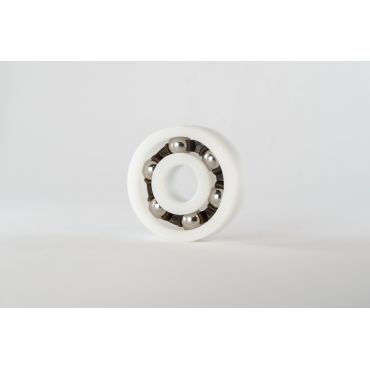
Plastic ball bearings for shaft sizes from 0.125” to 1.0” diameter
See product table below for dimensions and technical drawings
Our inch-sized plastic ball bearings feature acetal (POM-C) rings and nylon (PA66) cages, in order to deliver a durable and reliable solution. Stocked in the UK, these bearings provide a cost-effective and corrosion-resistant alternative, which makes them ideal for a variety of application.
Non-conductive and non-magnetic properties
These plastic bearings are classed as non-conductive, meaning they are designed to prevent the flow of electrical current. They may be used in applications where electrical insulation is critical.
Bearings with glass balls or plastic balls are completely non-magnetic. Meanwhile, those with 316 stainless steel balls exhibit only minimal magnetic properties, ensuring they are compatible with sensitive equipment and instruments.
Plastic bearings offer several advantages over traditional metal bearings, particularly in specific environments. One of the most significant benefits is their resistance to corrosion, which makes them ideal for use in wet or chemically aggressive conditions where metal bearings, such as those made from chrome steel or 440-grade stainless steel, might corrode or degrade over time.
Additionally, plastic bearings are much lighter than their metal counterparts. This can be a critical factor in applications where weight reduction is essential.
However, it’s important to note that plastic bearings are generally suited for applications with light loads and slow speeds. This is because of their softer material composition. Plastic bearings also have wider tolerances compared to precision metal bearings, making them more appropriate for low-precision applications.
While metal bearings excel in high-load, high-speed applications, plastic bearings provide a cost-effective, low-maintenance alternative for specialised environments.
Learn more about the advantages of stainless steel bearings, here.
Corrosion resistance and load capacity
Acetal resin is known for its exceptional corrosion resistance, making these bearings reliable in harsh environments. However, due to their softer composition compared to chrome steel or 440-grade stainless steel, plastic bearings are best suited for low-load and low-speed applications.
While they may not achieve the tight tolerances of metal bearings, they are comparable to 316 marine-grade bearings, making them suitable for low-precision applications.
Material options for various conditions
Resistance to chemicals and saltwater
Our imperial plastic bearings — shown in the table, below — are resistant to saltwater and a variety of aggressive chemicals, which is ideal for marine and industrial applications. For improved performance in extreme environments, SMB Bearings offers alternative ring or cage materials such as:
- Polyetheretherketone (PEEK)
- Polytetrafluoroethylene (PTFE)
- Polyvinylidene fluoride (PVDF)
These materials can provide even greater corrosion resistance and withstand extreme temperatures.
Temperature considerations
Plastic bearings are more susceptible to expansion and contraction because of temperature fluctuations.
Acetal bearings with a nylon bearing cage operate within a temperature range of -30 °C to 100 °C. However, this range can be extended with different materials; PTFE can be used in temperatures as low as -190 °C, while PEEK is suitable for high temperatures up to 250 °C.
Applications of plastic bearings
Marine and corrosive environments
Plastic bearings are extensively used in the marine industry, where they can be permanently submerged in seawater depending on the ball and cage materials. They are also widely applied in corrosive environments within the food and beverage industry, the pharmaceutical industry and other sectors where 440-grade stainless steel bearings would otherwise fail.
Specialised uses and alternatives
PVDF bearings are particularly suited for swimming pool applications because of their resistance to chlorine. For scenarios requiring superior corrosion resistance and higher load capacities, SMB Bearings also offers ceramic bearings made from zirconia or silicon nitride. These options provide excellent durability in challenging conditions.
Additional resources and technical information
For more detailed information, including technical drawings and load and speed data, click on INFO in the rows below. Please note that the maximum load and speed values are used in theoretical life calculations. To ensure optimal bearing life, we recommend operating at significantly lower loads and speeds than the maximum ratings.
Contact us for expert advice
Get in touch with our specialist bearing team today by emailing sales@smbbearings.com or fill in the contact form.

